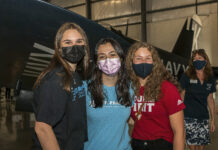I was raised on a farm in Central Iowa, the only son of a farmer, and the plan for me was clear: I would be a farmer. I wore my blue Future Farmers of America jacket proudly in high school and I believed strongly in the importance of my role in American Agriculture.
There it is, that word we talked so much about in Vegas, “culture.” Agriculture means farming to many, but if we take the word apart, “agri” means field, or land, and culture means way of life. Farming was not a job in my family; it was our way of life.
I took a four year diversion to Iowa State University, (a.k.a. Tractor Tech) and there I learned a new word: Agribusiness. Interest rates of nearly 20 percent made the “business of the land” unsustainable in 1980 and I changed my way of life. The ramifications of that decision on my family were profound.
Change doesn’t come easy for farmers…or pilots. Pilots are trained to do things consistently; it is called standardization and it is supposed to be a good thing. Psychologists say we change when we experience a significant emotional event. Some examples are marriage, death, or financial trouble.
The Commemorative Air Force had such an event in 2004 when our insurance carrier threatened to cancel our policy. There were no other alternatives. Whether it is farming or flying, change is easier when there are no alternatives.
The air show community is not facing an insurance or regulatory crisis, yet. We still have some alternatives, but that could change. Figure 1 shows the trend for the last seven years. Not only are the numbers too high, but the trend is moving in a terrible direction. The status quo is like getting into the farming business in 1980…not a sustainable option.
We’re in a poker game. We can put our chips on taking some proactive steps that we control, or we can bet on the “do nothing and hope the current trend is a fluke” strategy. Losing this bet will cost lives and could result in draconian changes to our industry that we don’t want and we won’t control.
The ICAS leadership has chosen the former strategy and the response of the membership is generally supportive, but scattered through our ranks is a “if a performer wants to kill themselves, it’s their business” attitude.
It’s easy to know where this attitude comes from. When I become a member of the ICAS Safety Committee, I was told that our charge was to protect the spectators and make sure the performers followed the rules. Well that hasn’t been working.
Let’s put this in warbird pilot language. “If ya’ always do what ya’ always done, you’ll always git what ya always got.” What we got is six dead friends last year and a steady climbing trend. That ain’t cuttin’ it. As performers and producers, we can and we must do better and ICAS has a role to play in that improvement.
So, if ICAS is going to get try to improve our industry, the question is simple, “What do we do?” It’s the answers that are tough and they are not fully developed. The previous paragraph suggests that there are two elements to this endeavor, the members and the association. Since ICAS cannot and should not climb into the cockpit, our efforts must focus on background areas like, education, awareness, a feedback loop, and compliance with our current rules.
There has been fear and mumbling amongst the members about a bunch of new rules. Changing the rules is pointless if the current rules are not complied with or enforced. Adding new rules dilutes the value of the rules we currently have and increases non-compliance. More rules will not improve our safety record. Should our efforts fail, and the FAA or the insurance company steps in, we lose control and rule changes are a certainty. Changing the rules is always an option, but it should be our last option.
The mission we are embarking on is really a quality improvement initiative. Manufacturing businesses spend billions of dollars researching and implementing programs that improve the quality and efficiency of their processes. These programs have acronym names like TQM, TQI, ISO-9000, SPC and many others. The common element in all of them is measuring metrics and a feedback loop.
Resorting again to words that a warbird pilot can understand, “You can’t manage what you don’t measure.” Problems do not fix themselves. For instance, a common complaint among air show performers is disruptions in their preparation ritual shortly before a performance. Whether the problem is fuel, smoke oil, water, or a port-a-pottie, the time to prepare before a performance is critical.
The industry can, and should, figure out a way to measure this metric, and report the results. Decisions can then be made about how to collect and report the data so performers don’t fear punitive damage. Sure there are details to be worked out, but that can be done and we can improve performance in that area.
Major consumer products companies, air show producers, and air show performers spend massive amounts of money on advertising. Why? Because it works. Every advertiser wants top of mind awareness. Studies prove that advertising changes behavior. We need something as simple as an advertising campaign to create top of mind awareness about the risks in our business with the goal of performers and producers changing behaviors to exploit every opportunity to minimize the unnecessary risks.
Imagine what would happen to accident rates if every air show performer and producer sat down and identified the risk associated with each particular activity. Then, if they dissected that activity into its most basic components, and searched for ways to reduce the risk while still achieving our entertainment objective, our accident rates would plummet.
When manufacturing companies engage in these activities, not only do they reduce the risks in their workplaces, their product quality goes up and their costs go down. When that happens, they get excited and they share their experiences with others. If an air show develops a good program that protects the last 30 minutes before a performer flies, ICAS needs a vehicle to collect that information and develop the educational tools needed to replicate such a program across the country.
Education is an essential element of any effort to change or improve any business and ours is no exception. Within our ranks, we have incredible resources of knowledge and skill. The problem is we don’t communicate very well. ICAS needs to formalize training for both producers and performers. Our past education efforts have been primarily focused on producers and air bosses. There have been accidents that are clearly attributable to a lack of understanding of the basic physics of aviation.
Useful, educational blast emails that refresh old-timers and educate the newcomers on tricks of the trade or aeronautical principle long forgotten are useful. They can answer questions that people may be unwilling to ask of their ACE or another performer for fear of seeming stupid.
That’s a partial list of areas that could be addressed in our effort to improve our industry. Now, the tough question: “Who is going to the work?”
The ICAS leadership is committed to this process. Most likely the Board will hire an individual on a part-time or contract basis to take the responsibility for development and implementation of the strategies that rise to the top of an ongoing discussion. My examples in this article are just that, examples, not commitments to attack those particular problems. The Board, Safety and ACE Committees may find other more pressing issues to focus on first, but what ever the issues, the important thing is having someone who is focused on the problem.
Business management principles like data collection, data analysis, education, and communication are a much better bet than wishing and waiting to see if our accident trend turns around in 2008. Wouldn’t it be wonderful if simply hiring a cheerleader to send out emails and hold seminars would drop our accident rate? We all know it’s not that easy. ICAS can’t make us safe; that responsibility resides with the members in field.
The success or failure of this initiative also rests with the members. The leadership is committed, but unless the members join this effort, it will become another “flavor of the month” that will flash in the pan and burn out. It really is up to us. We can mumble and grumble, or we can get on board.
Getting on board is easy. It is the same for performers and producers. It starts by looking in the mirror and asking a simple question, “What can I do to drive unnecessary risk out of my operation?” Even the best can do better in some area. No matter who you are or what role you play in our business, answer that question and make a commitment to change that behavior. Then share that success with your peers in an article or letter to the editor or in your discussions with those around you. That is how we change our culture, one member, one small success at a time. Success is contagious.
Graduating from college, I had a choice. I could have bet that 20 percent interest rates were a fluke and hoped that they would change. I knew in my gut that starting to farm in 1980 wouldn’t work. It did not work for most of my friends who tried. I changed my behavior and took a different path. It was tough at the time, but the long-term payoff has been incredible.
ICAS members have a high stakes bet to place. The chips are lives…our lives. We can bet them on the, “ignore the facts and hope they change” strategy, or a pro-active strategy that will yield benefits for years to come. The right choice ain’t that tough for a farmer or even a warbird pilot.








